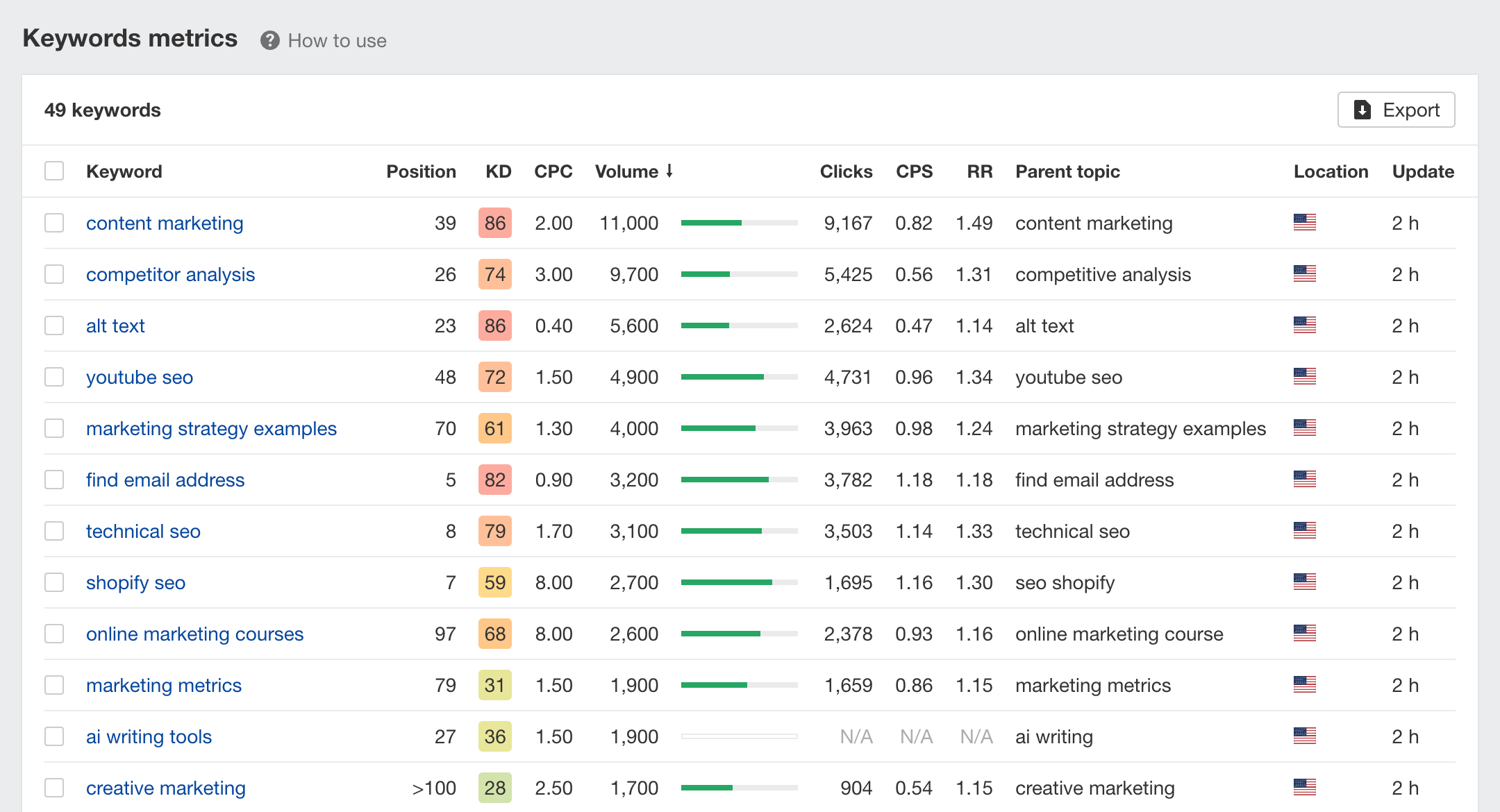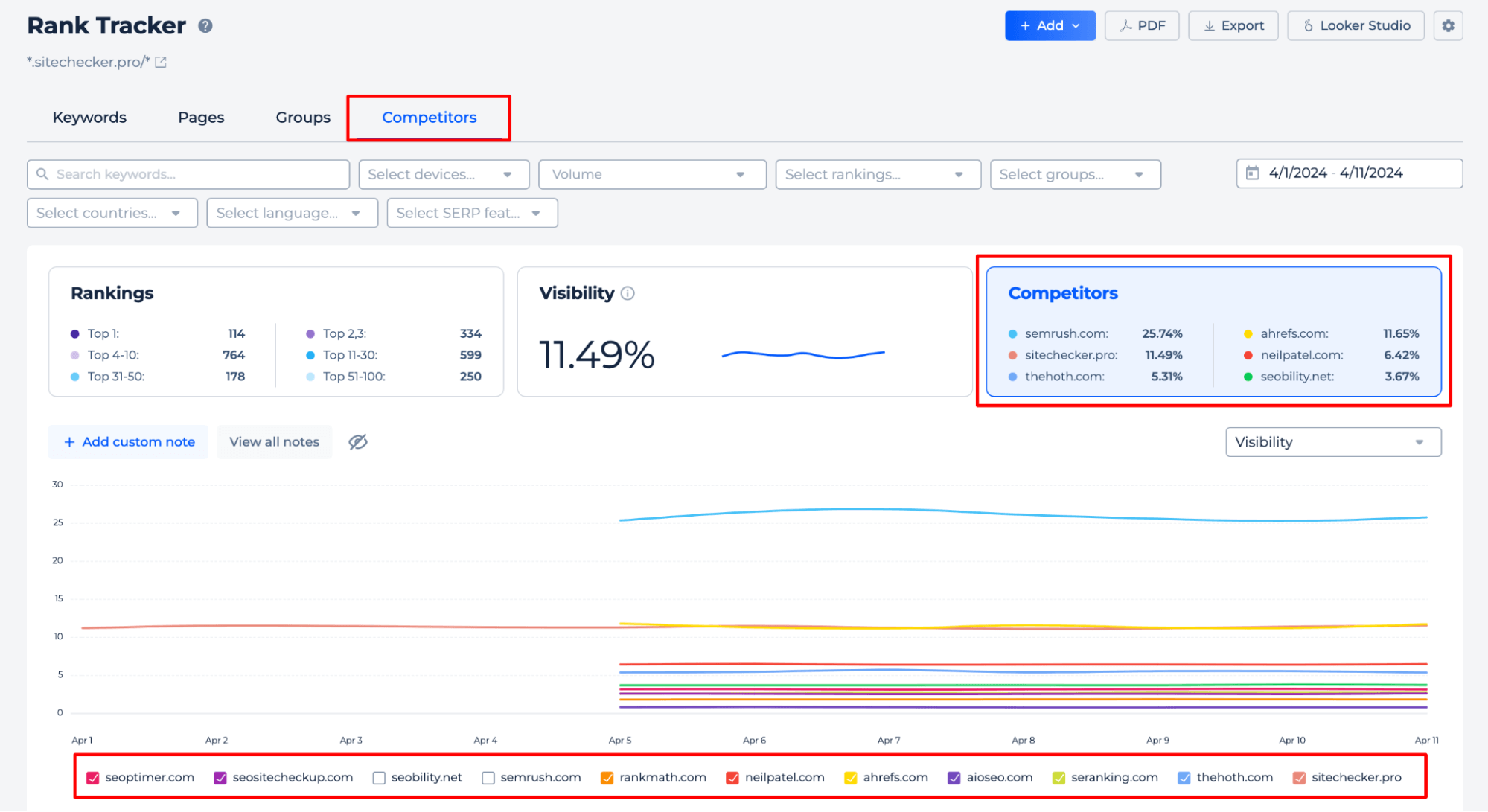Rank tracker keywords are the cornerstone of any successful SEO strategy. These keywords help you monitor your website's performance, identify areas for improvement, and ensure that your content aligns with what your audience is searching for. By leveraging rank tracker keywords, businesses can stay ahead of the competition, optimize their content, and drive organic traffic. In today's digital landscape, understanding how to use these tools effectively is not just an advantage—it's a necessity.
Whether you're a seasoned SEO professional or a beginner looking to enhance your website's visibility, rank tracker keywords provide the insights you need to succeed. They allow you to track your rankings across various search engines, analyze competitors, and refine your keyword strategy. With the right approach, you can transform raw data into actionable insights that propel your website to the top of search engine results pages (SERPs).
In this article, we’ll explore everything you need to know about rank tracker keywords—from understanding their importance to implementing them effectively in your SEO campaigns. We’ll also address common questions and provide practical tips to help you maximize their potential. By the end, you’ll have a clear roadmap for leveraging rank tracker keywords to achieve your digital marketing goals.
Read also:Understanding Alan Dershowitzs Hourly Rate A Deep Dive Into His Legal Expertise
Table of Contents
- What Are Rank Tracker Keywords?
- Why Are Rank Tracker Keywords Important?
- How to Choose the Right Rank Tracker Tool?
- Can Rank Tracker Keywords Improve Your SEO?
- How to Use Rank Tracker Keywords Effectively?
- What Are the Common Mistakes to Avoid?
- How to Analyze Your Competitors with Rank Tracker?
- Frequently Asked Questions
What Are Rank Tracker Keywords?
Rank tracker keywords are specific terms or phrases that you monitor to evaluate your website's performance in search engine rankings. These keywords are integral to understanding how well your content resonates with your target audience and whether it aligns with their search intent. By tracking these keywords, you can gauge your website's visibility, identify trends, and adjust your SEO strategy accordingly.
For example, if you run an e-commerce store selling eco-friendly products, you might track keywords like "sustainable home goods" or "eco-friendly kitchenware." Monitoring these terms allows you to see how your website ranks compared to competitors and whether your content is optimized for these queries. Rank tracker keywords also provide insights into seasonal trends, enabling you to capitalize on spikes in search volume.
Moreover, rank tracker keywords are not just about monitoring your own performance. They also allow you to keep an eye on competitors, helping you identify gaps in their strategies and opportunities for your brand. This competitive intelligence is invaluable for staying ahead in the ever-evolving world of SEO.
Why Are Rank Tracker Keywords Important?
Rank tracker keywords play a pivotal role in the success of any SEO campaign. They serve as a barometer for your website's health, indicating whether your efforts are paying off or if adjustments are needed. Without these keywords, you're essentially navigating the SEO landscape blindfolded, relying on guesswork rather than data-driven decisions.
One of the primary benefits of rank tracker keywords is their ability to provide real-time feedback. For instance, if you notice a sudden drop in rankings for a particular keyword, it could signal issues like algorithm updates, technical errors, or increased competition. By identifying these changes early, you can take corrective action before they impact your traffic and revenue.
Additionally, rank tracker keywords help you measure the ROI of your SEO efforts. By correlating keyword performance with metrics like organic traffic, bounce rate, and conversion rate, you can determine which keywords are driving the most value. This insight allows you to allocate resources more effectively and focus on high-performing keywords that deliver tangible results.
Read also:Exploring The World Of Custom Udon Hentai A Unique Perspective
How to Choose the Right Rank Tracker Tool?
With so many rank tracker tools available, choosing the right one can feel overwhelming. However, selecting the appropriate tool is crucial for ensuring accurate data and actionable insights. Here are some factors to consider when making your decision:
- Accuracy: The tool should provide precise and up-to-date rankings for your target keywords. Inaccurate data can lead to misguided decisions and wasted efforts.
- User-Friendliness: A good rank tracker tool should have an intuitive interface that makes it easy to navigate and interpret data. Look for features like dashboards, visual reports, and customizable alerts.
- Integration: Ensure the tool integrates seamlessly with other platforms you use, such as Google Analytics, Google Search Console, or CRM systems. This integration allows for a more holistic view of your SEO performance.
- Competitor Analysis: The ability to track competitors' rankings is a must-have feature. It helps you identify their strengths and weaknesses, enabling you to refine your strategy.
- Pricing: While cost shouldn't be the sole deciding factor, it's important to choose a tool that fits your budget without compromising on essential features.
Some popular rank tracker tools include Ahrefs, SEMrush, and Moz Pro. Each of these platforms offers unique features and benefits, so it's worth exploring their free trials to determine which one aligns best with your needs.
Can Rank Tracker Keywords Improve Your SEO?
Absolutely! Rank tracker keywords are a powerful tool for enhancing your SEO strategy. By providing insights into keyword performance, they enable you to optimize your content, improve rankings, and drive more organic traffic. Here's how they contribute to SEO success:
Firstly, rank tracker keywords help you identify high-performing keywords that are worth targeting. By focusing on these terms, you can create content that resonates with your audience and meets their search intent. For example, if you notice that a particular keyword drives significant traffic and conversions, you can create more content around that topic to capitalize on its success.
Secondly, rank tracker keywords allow you to spot underperforming keywords that need improvement. If certain terms consistently rank poorly, it may indicate issues like weak content, poor on-page optimization, or high competition. Addressing these issues can help you improve your rankings and visibility.
Finally, rank tracker keywords provide a benchmark for measuring progress. By tracking your rankings over time, you can evaluate the effectiveness of your SEO efforts and make data-driven decisions. This ongoing analysis ensures that your strategy remains agile and responsive to changes in the digital landscape.
How to Use Rank Tracker Keywords Effectively?
Using rank tracker keywords effectively requires a strategic approach. Here are the key steps to ensure you're getting the most out of these tools:
Step 1: Identify Your Target Keywords
Before you can track your rankings, you need to identify the keywords that matter most to your business. Start by brainstorming terms and phrases that your target audience is likely to search for. Tools like Google Keyword Planner, Ubersuggest, and AnswerThePublic can help you generate ideas and assess search volume.
Once you have a list of potential keywords, prioritize them based on relevance, competition, and search intent. Focus on long-tail keywords, as they often have lower competition and higher conversion rates. For example, instead of targeting "shoes," consider targeting "best running shoes for flat feet."
Step 2: Monitor Your Keyword Performance
After identifying your target keywords, use your rank tracker tool to monitor their performance. Set up regular reports to track changes in rankings, traffic, and other key metrics. This ongoing analysis will help you identify trends, spot issues, and refine your strategy.
Pay attention to fluctuations in rankings, especially after major algorithm updates or content changes. If you notice a significant drop, investigate potential causes such as technical issues, backlink penalties, or shifts in search intent. Addressing these issues promptly can help you recover lost rankings and maintain your visibility.
What Are the Common Mistakes to Avoid?
While rank tracker keywords are incredibly useful, there are some common pitfalls to watch out for. Avoiding these mistakes can help you maximize the effectiveness of your SEO strategy:
- Overlooking Long-Tail Keywords: Many businesses focus exclusively on high-volume keywords, neglecting the potential of long-tail keywords. These longer, more specific phrases often have less competition and higher conversion rates.
- Ignoring Competitor Analysis: Failing to monitor competitors' rankings can leave you at a disadvantage. By analyzing their strategies, you can identify opportunities to outperform them.
- Neglecting Local SEO: If your business serves a specific geographic area, don't forget to track local keywords. Tools like Google My Business and local rank trackers can help you optimize for local search.
- Focusing Solely on Rankings: While rankings are important, they shouldn't be your only metric. Consider other factors like traffic, engagement, and conversions to get a complete picture of your SEO performance.
By avoiding these mistakes, you can ensure that your rank tracker keywords deliver the insights you need to succeed.
How to Analyze Your Competitors with Rank Tracker?
Competitor analysis is a critical component of any SEO strategy, and rank tracker keywords can provide valuable insights into your competitors' performance. By monitoring their rankings, you can identify their strengths, weaknesses, and opportunities for your brand.
Start by identifying your main competitors and tracking their rankings for your target keywords. Look for patterns in their performance, such as consistent top rankings for certain terms or sudden drops in visibility. This analysis can reveal gaps in their strategy that you can exploit.
Additionally, pay attention to their content strategy. Are they producing high-quality, engaging content that resonates with their audience? Are they leveraging backlinks effectively? By answering these questions, you can refine your own strategy and differentiate your brand in the marketplace.
Frequently Asked Questions
What Are the Best Practices for Using Rank Tracker Keywords?
To get the most out of rank tracker keywords, focus on identifying relevant terms, monitoring performance regularly, and refining your strategy based on data-driven insights. Avoid common mistakes like neglecting long-tail keywords or ignoring competitor analysis.
How Often Should I Check My Rank Tracker Keywords?
The frequency of monitoring depends on your goals and the volatility of your industry. For most businesses, checking rankings weekly or bi-weekly is sufficient. However, if you're in a highly competitive niche, daily monitoring may be necessary.
Can Rank Tracker Keywords Help with Local SEO?
Yes, rank tracker keywords are invaluable for local SEO. By tracking local terms and phrases, you can optimize your content for geographic-specific queries and improve your visibility in local search results.
Conclusion
Rank tracker keywords are an indispensable tool for anyone looking to enhance their SEO strategy. By providing insights into keyword performance, competitor analysis, and overall website health, they empower you to make informed decisions and achieve your digital marketing goals. Whether you're a beginner or an experienced SEO professional, leveraging rank tracker keywords can help you stay ahead of the competition and drive sustainable growth.
To get started, choose the right rank tracker tool, identify your target keywords, and monitor your performance regularly. Avoid common mistakes, analyze your competitors, and refine your strategy based on data-driven insights. With the right approach, you can unlock the full potential of rank tracker keywords and take your SEO efforts to the next level.
For more information on SEO tools and strategies, check out this comprehensive guide to SEO tools.

